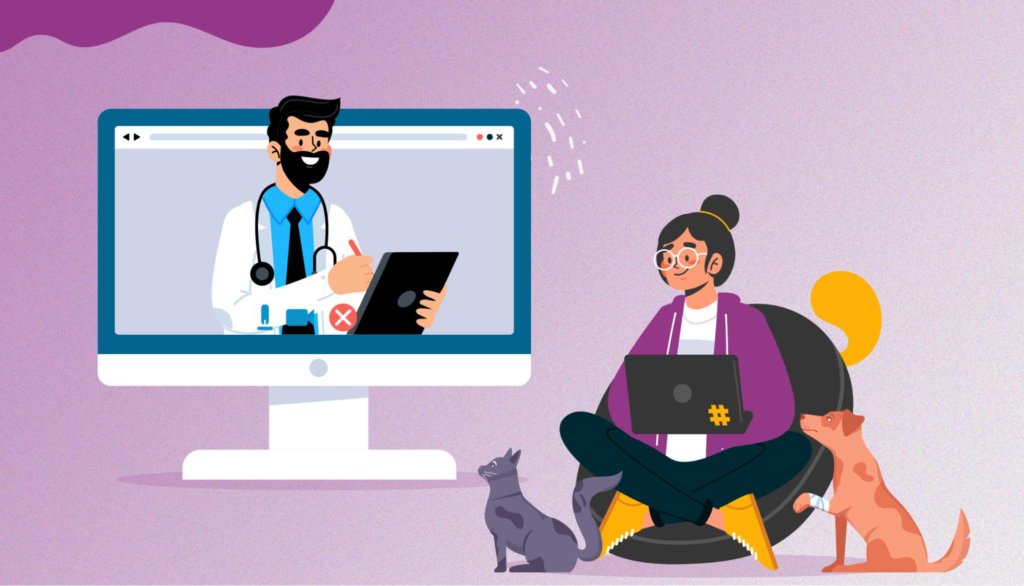If you own a veterinary practice and need a way to keep up with the latest medical advancements and care methods for your patients, you may want to consider hiring a veterinary technician. These trained professionals are an important part of a veterinary team and can provide a wide range of services, from administering vaccinations to conducting laboratory tests.
While in-house veterinary technicians are often considered the standard, virtual veterinary technicians are also growing in popularity. This informative guide will cover what you need to know about hiring a veterinary technician in 2022, including the common responsibilities in this role and the skills these professionals should master.
What is a veterinary technician?
A veterinary technician is a professional who provides medical care for animals under the supervision of a licensed veterinarian. These medical professionals typically work in animal hospitals, animal shelters, humane societies, and private practices.
US Bureau of Labor Statistics (BLS) data reports that the job outlook for vet techs is expected to grow 15% through 2030 — growth that is mainly due to a boost in the number of pet owners and the demand for more advanced medical care for animals.
Most veterinary technicians have an associate's degree or certificate from a veterinary technology program. The training received in these programs covers a wide range of topics related to animal health, including anatomy and physiology, medical terminology, pharmacology, and specialty areas such as nutrition or dentistry.
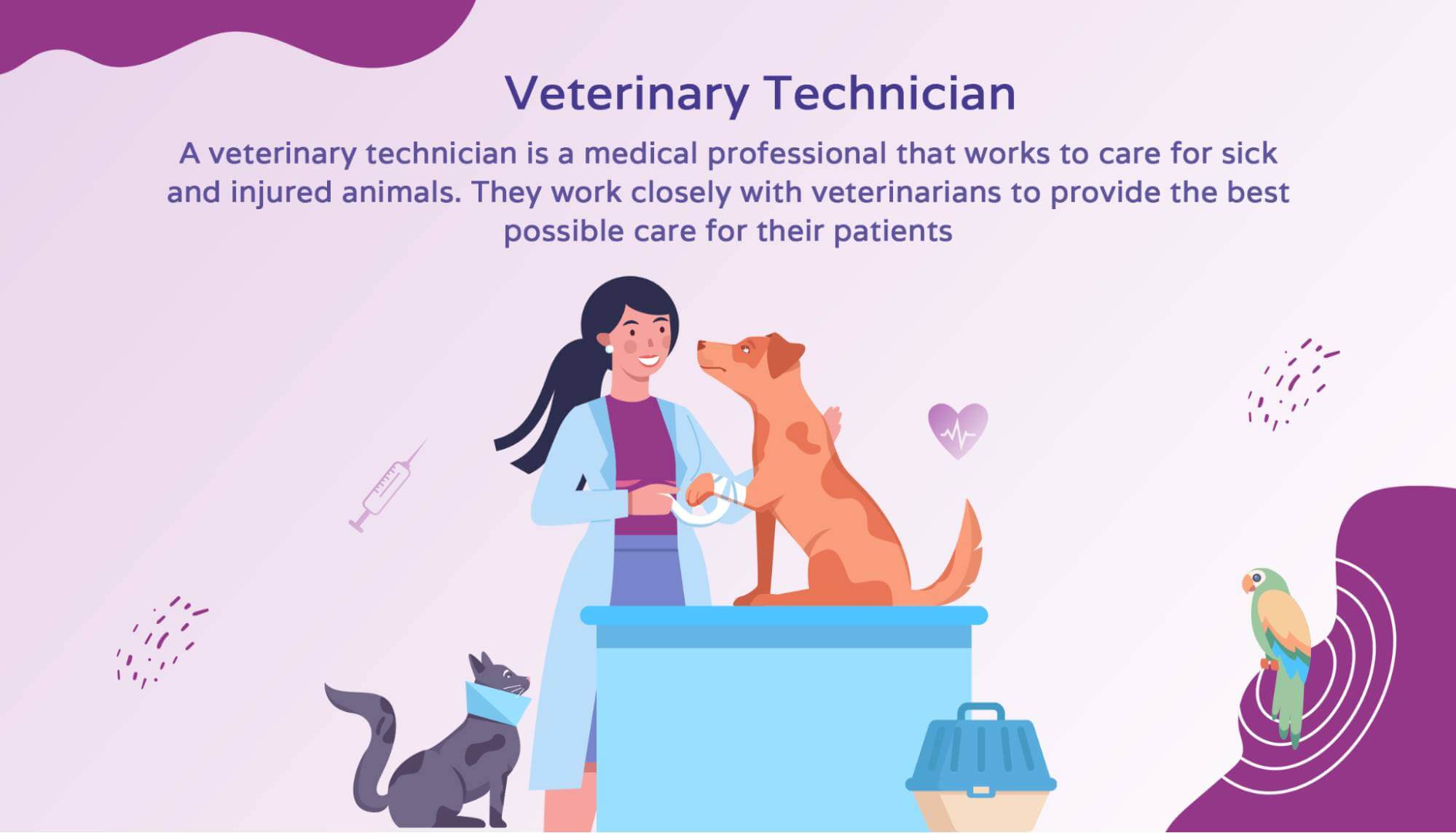
Some states require licensed veterinary technicians to take continuing education courses to maintain their license, and many technicians choose to do so voluntarily to stay up-to-date on the latest developments in animal health care. This type of role is a good fit for individuals who are passionate about animal welfare and want to work in a challenging career caring for creatures big and small.
If you need a veterinary technician on your team, check out the Veterinary Healthcare Virtual Services available from Hello Rache.
What does a veterinary technician do?
Veterinary technologists have numerous responsibilities and strive to provide their patients with the highest quality of care possible. As well as assisting veterinarians with clinical duties, these medical professionals may also carry out administrative duties like scheduling appointments, following up on referrals, and handling billing. These types of tasks are crucial for keeping a veterinary practice running smoothly. Here are some of the most common types of veterinary technician duties:
Administering vaccinations
Veterinary technicians often administer vaccines to animals. This task requires a great deal of knowledge and experience, as some vaccines can be dangerous if not administered correctly. Receiving vaccines can be a stressful or frightening time for animals and their owners so it’s important that veterinary technicians handle these situations with care and compassion.
Collecting laboratory samples
Veterinary technicians need to be able to collect a range of samples for laboratory testing, including blood work and urinalysis. These tests are essential for diagnosing and treating a wide range of conditions.
Assisting with surgical procedures
Veterinary technicians may assist veterinarians during surgery. This includes setting up the operating room, preparing the animal for surgery, and monitoring the animal’s vital signs during the procedure. Veterinary technicians play a crucial role in ensuring that surgical procedures are performed safely and successfully.
Answering incoming calls and inquiries
One of the most important administrative roles of a veterinary technician is to answer incoming calls and inquiries. This involves greeting clients, scheduling appointments, and answering questions about animal health care. The vet's office can be hectic, and it's important that veterinary technicians can handle a variety of tasks at once while remaining calm and professional.
Scheduling appointments and specialist referrals
Veterinary technicians are responsible for scheduling appointments and referring clients to specialists, if necessary. This includes keeping track of the vet's schedule, as well as contacting specialists and setting up appointments.
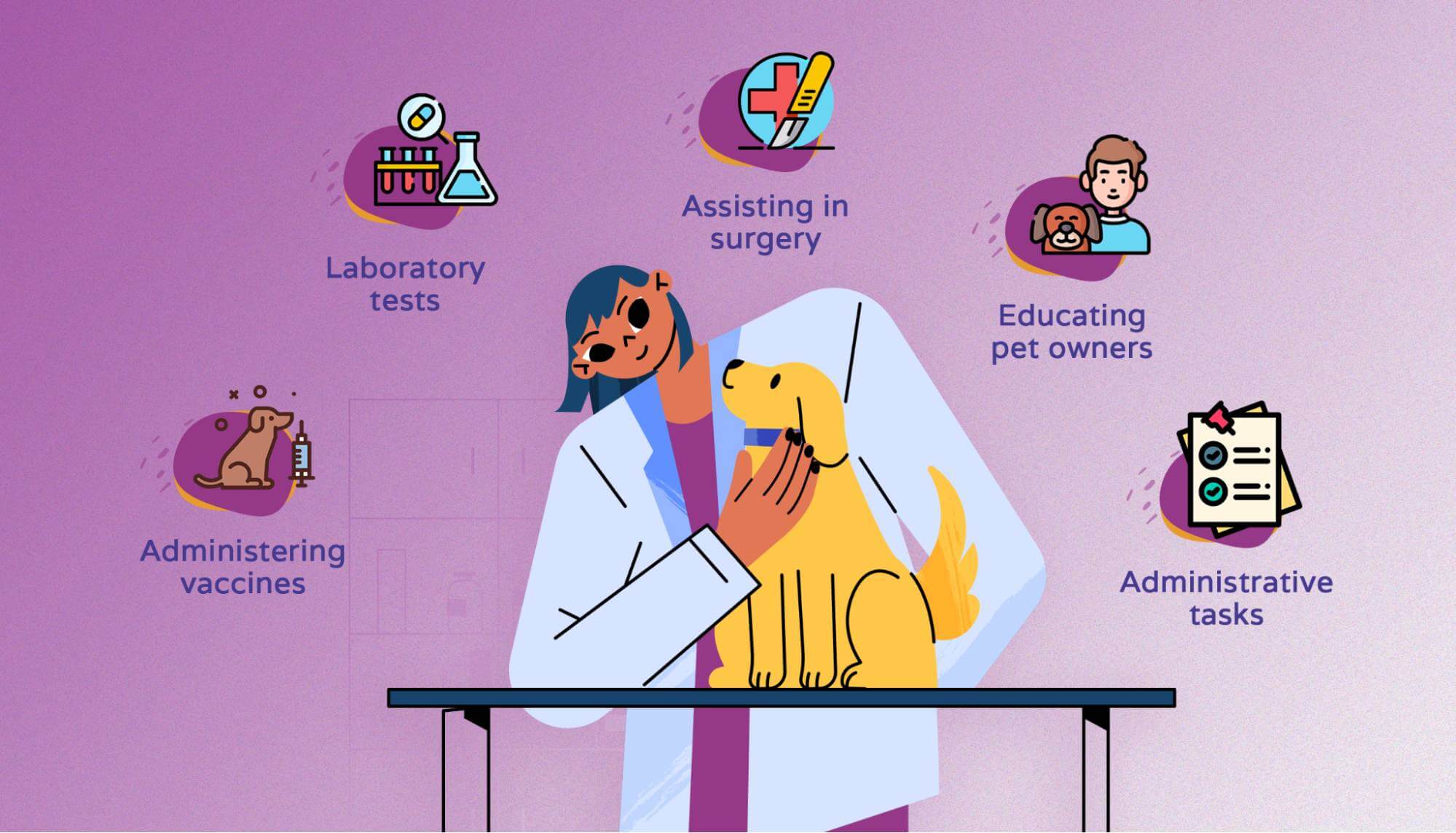
Maintaining medical records
Medical records are an important part of any veterinary practice. Veterinary technicians are responsible for maintaining accurate and up-to-date medical records for all of the animals in their care. This includes keeping track of immunizations, test results, and other important health information.
Educating pet owners
A veterinary technician's job also includes educating pet owners about animal health care. This might involve conference calls, answering questions, and writing articles or pamphlets. It's important that veterinary technicians have excellent communication skills and can convey information clearly and concisely.
Processing payments
Veterinary technicians are often responsible for processing payments, whether it's for an office visit, a procedure, or medication. Virtual veterinary technicians from Hello Rache use HIPAA-compliant software like Zoom to connect with patients and process payments via an onsite card processing terminal.
Skills a veterinary technician should master
In order to be a successful veterinary technician, there are a few essential skills to master. These skills will help technicians excel and grow in their careers, leading to additional opportunities over time.
Critical thinking
Veterinary technicians must be able to think critically to handle stressful situations and maintain organization. They must be able to move quickly to handle situations and make decisions based on the available information.
Communication
Veterinary technicians must be able to effectively communicate with clients, veterinarians, and other members of the veterinary team. They must be able to clearly explain procedures, provide instructions, and answer any questions that may arise.
Compassion
Veterinary technicians must be compassionate in order to care for the animals effectively. They must be able to empathize with pet owners and understand the emotional stress that comes with owning a sick or injured animal.
Attention to detail
Veterinary technicians must pay close attention to detail in order to accurately perform their tasks. They must be able to keep meticulous medical records and maintain composure in a fast-paced environment.
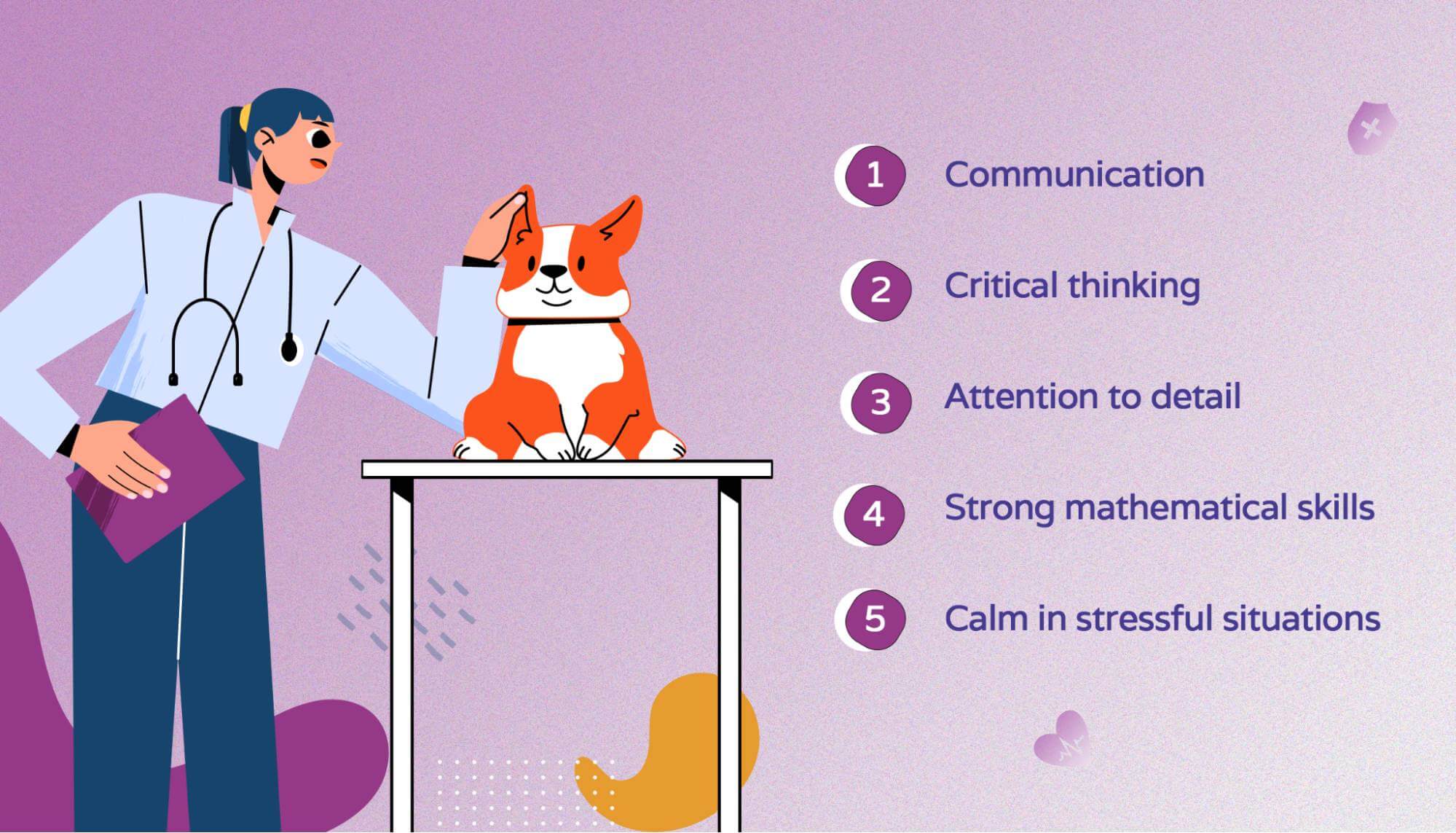
Organization
Veterinary technicians must be well-organized in order to manage their time and tasks effectively. They must be able to prioritize tasks, maintain accurate records, and keep the veterinary clinic running smoothly. When an office is disorganized, there is more room for error when it comes to charts and patient care.
Mathematical skills
Veterinary technicians must be able to perform basic mathematical calculations. This is important for data entry and working with prescriptions. The ability to take measurements accurately and quickly is crucial in both emergency veterinary medicine and general veterinary offices.
The ability to work under pressure
Veterinary technicians often work in fast-paced environments and must be able to handle the stress that comes with it. They must be able to think quickly, make decisions, and act calmly to provide the best possible care for the animals.
While these are specialized skills, many veterinary technician programs require students to complete general education courses prior to admission. These courses help build the skill set a technician needs to be successful in their career.
Some common majors for those interested in becoming a skilled veterinary technician are:
- Animal science
- Biology
- Chemistry
- Physics
There are a few important facts to keep in mind when searching for the right veterinary technician for your veterinary practice. First, ensure the program is recognized by the American Veterinary Medical Association (AVMA). This will ensure that you receive the best staff match for your business needs.
Additionally, make sure the program offers externships or clinical rotations. These experiences allow technicians to apply their knowledge and skills in a real-world setting.
There are many different types of veterinary technician positions, from those that work in a private practice to those that work in a research lab. It’s important that technicians find the job that best suits their skills and interests.
Veterinary technician salary and demand
With the increase in demand for animal care, the veterinary technician field is expected to grow over the next few years at a much faster rate than the average for all occupations.
This is due in part to the growing recognition of the importance of animal health and the need for qualified technicians to provide care. Many veterinary providers across the country are now requiring that their technicians be credentialed and have completed an accredited veterinary technician program. This not only ensures that technicians are qualified to provide the best possible care but also that they receive a competitive salary.
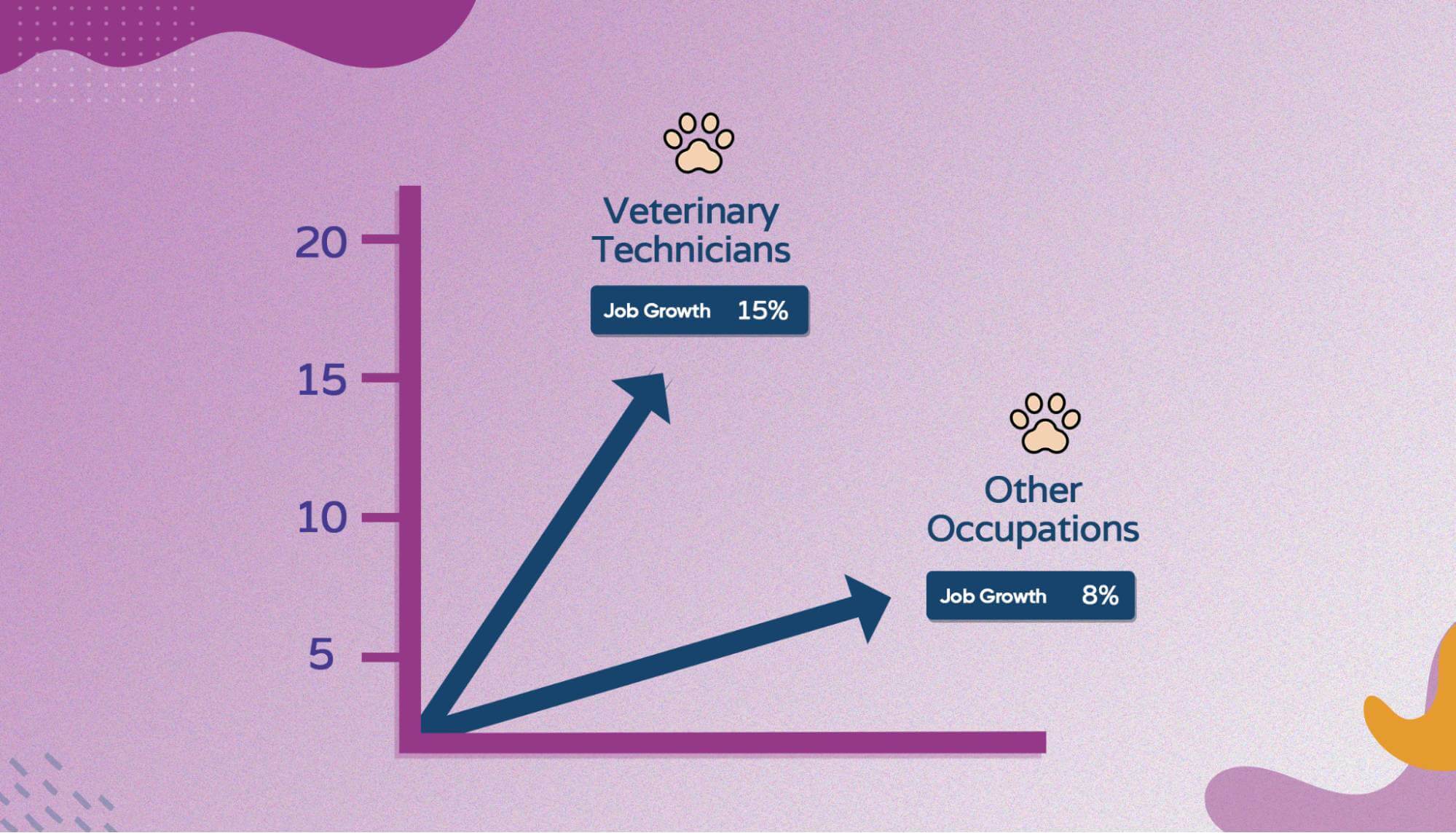
The salary for a Veterinary Technician was $36,850 as of 2021, though this can vary due to numerous factors. Some of the most influential salary factors include:
Location
When hiring a veterinary technician for your office, you should consider the cost of living in the area where you’ll be located. In general, technicians based in rural areas tend to make less than those working in more urban settings.
Type of practice
The type of veterinary practice can also impact salary. For example, technicians working in private practices typically make more than those working in shelters or research laboratories.
Experience
Veterinary technicians with more experience tend to be paid more than those who are just starting out. While entry-level positions often pay less, these types of roles provide vet staff with an excellent opportunity to gain the experience needed to secure more senior positions.
Credentials
As mentioned above, many veterinary practices now require that technicians be credentialed through an accredited program. Those who have completed a degree or certificate from such a program often command a higher salary than those without formal training.
While there are countless factors that can impact salary, the benefits of hiring veterinary technicians are clear. They play an important role in animal care and provide a much-needed service to the veterinary community.
When searching for the right technician for your business, be sure to consider all of the factors that can impact salary and demand. This will help you find the best possible match for your needs.
What is a virtual vet technician?
A virtual vet technician is a veterinary technician who provides administrative assistance to veterinary offices and practices remotely. Virtual veterinary technicians are becoming more popular as technology advances and veterinary practices look for ways to improve efficiency.
By outsourcing some of the non-clinical tasks to a remote worker, veterinary practices can free up time for the in-house veterinarians and technicians to focus on providing quality patient care.
Some of the benefits of utilizing a virtual veterinary technician alongside your current staff include:
Reduced hold times
Virtual veterinary technicians can provide immediate support to your clients, meaning they won't have to wait on hold or be transferred to speak to someone in the office. This can save time for both the client and the veterinary practice.
Improved efficiency
By outsourcing some of the non-clinical tasks, the veterinary practice can run more smoothly and efficiently. Taking over tasks like scheduling referrals and appointment scheduling can help free up time for in-house veterinarians and technicians, so they can focus on providing patient care.
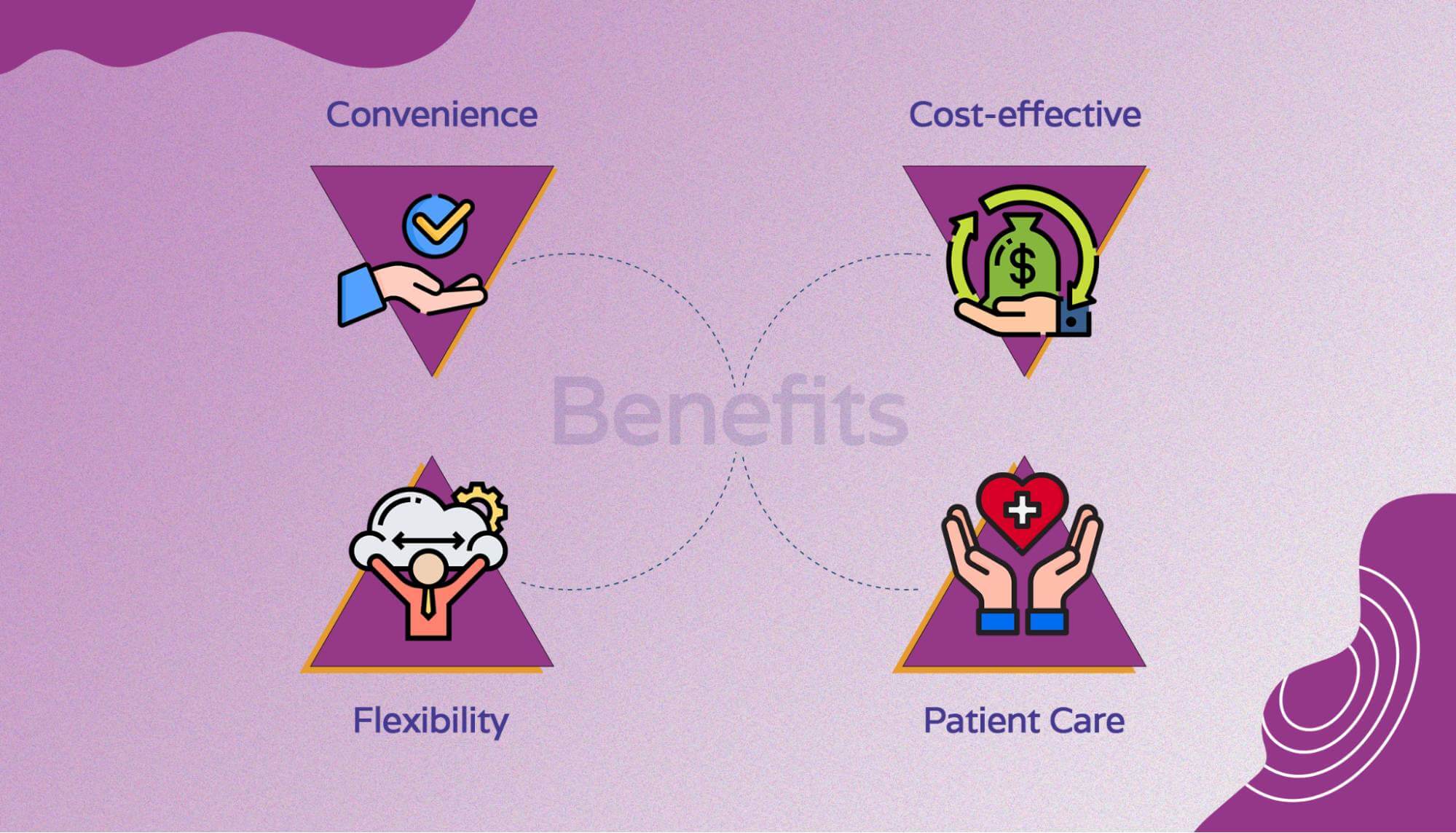
Cost savings
Hiring a virtual veterinary technician to support your in-house staff is an excellent way to cut costs. You will be able to reduce the amount of overtime your current staff works, and you won't have to pay for benefits or vacation time. When you work with Hello Rache, you only have to pay for the time that you use, so you can save even more.
Flexibility
A virtual veterinary technician can provide support during times when your regular staff is unavailable, like after-hours or on weekends. This can be incredibly helpful if your practice is short-staffed or you have an unusual surge in appointments.
Improved patient care
While virtual veterinary technicians don't provide direct patient care, they can still play an important role in supporting the veterinary team. By handling the tasks that are often stressful and time-consuming, they can help to improve the overall quality of care that your patients receive. If an emergency arises, your staff will be able to focus on providing care to the patient without worrying about completing administrative tasks or missing phone calls.
Scheduling support
One of the most important roles of a virtual veterinary technician is providing support with scheduling. They can handle everything from making appointments to calling in prescriptions, which can take a lot of pressure off of the veterinary staff.
Improved practice profitability
Virtual veterinary technicians can help improve your practice's profitability by freeing up the time of your veterinary staff. When your staff has more time to see patients and provide care, they can generate more revenue for the practice. Virtual vet techs can also keep on top of appointment reminders, reducing no-shows and maximizing the time available for seeing paying patients.
Consider a virtual veterinary technician to help optimize your workflow
Now that you know the lucrative benefits of hiring a veterinary technician, you may wonder how to hire one. There are numerous ways to find both in-house and virtual veterinary technicians, all of which can help you find the right fit for your practice.
For in-house roles, you can start your search by asking your colleagues for recommendations. You can also search in reputable online directories, such as the American Association of Veterinary State Boards, to find veterinary technicians in your area. Once you've found a few candidates, be sure to check their professional references.
When you're ready to hire a veterinary technician, be sure to communicate your needs and expectations clearly. This will help to ensure that you hire a qualified and reliable candidate who can help you optimize your workflow.
Statistics show that virtual vet app downloads increased by 40% in March of 2020 due to the COVID-19 pandemic. The pandemic also resulted in more people wishing to work from home. Many veterinary practices began to adopt virtual or hybrid care models. This trend is likely to continue, which means that more and more veterinary practices will need to consider hiring virtual veterinary technicians.
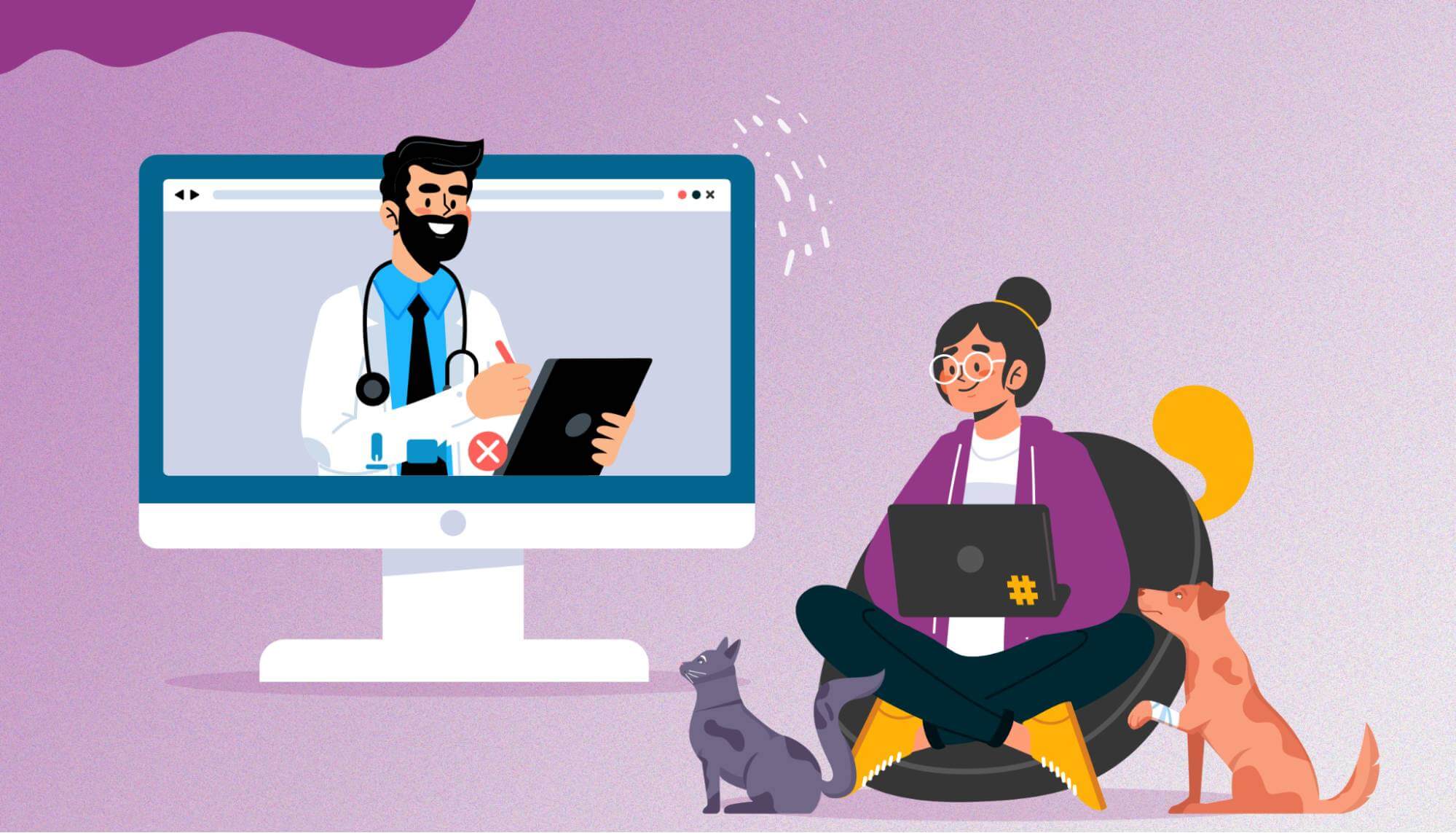
Hello Rache has a Veterinary Healthcare Virtual Assistant service that can help you unlock all the benefits of using a virtual vet technician. Trusted by providers across the globe, the virtual technicians on the platform can help you optimize your workflow, improve patient care, and increase practice profitability.
Find a virtual veterinary technician today
Veterinary technicians are a fundamental part of the veterinary team. They are responsible for both clinical and administrative tasks. Virtual veterinary technicians can be accessed from anywhere in the world and are often more cost-effective than in-house veterinary technicians.
If you're looking for a capable and reliable virtual veterinary technician, Hello Rache can help. With a global network of highly-skilled professionals, Hello Rache is the leading platform for finding virtual veterinary technicians.
Contacting Hello Rache is an excellent way to find a virtual veterinary technician who can help improve the quality and reliability of your practice. With the help of a virtual veterinary technician, you can focus on providing the best possible care for your patients.

